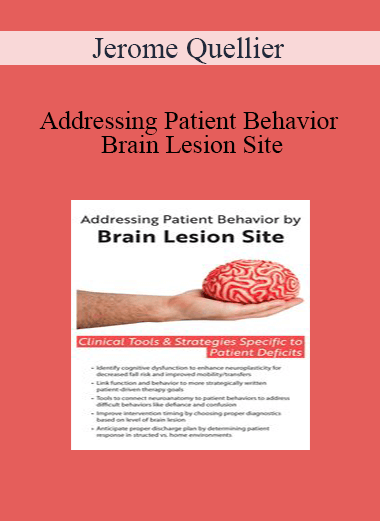Buy Jerome Quellier – Addressing Patient Behavior by Brain Lesion Site: Clinical Tools & Strategies Specific to Patient Deficits Course at GBesy. We actively participate in Groupbuys and are committed to sharing knowledge with a wider audience. Rest assured, the quality of our courses matches that of the original sale page. If you prefer, you can also buy directly from the sale page at the full price (the SALEPAGE link is directly provided in the post).
 [Instant Download] – Immediately deliver the download link after receiving the payment
[Instant Download] – Immediately deliver the download link after receiving the payment
Jerome Quellier – Addressing Patient Behavior by Brain Lesion Site: Clinical Tools & Strategies Specific to Patient Deficits course with special price just for you: $219.99 $41
- Faculty:
- Jerome Quellier
- Duration:
- 5 Hours 52 Minutes
- Format:
- Audio and Video
- Copyright:
- Jun 07, 2019
Description
Outline
Neuroanatomy And The Impact On Cognitive Processing
- Basic neuronal anatomy
- Brain wiring: Association, projection, and commissural fiber tracts
- Brain lobes locations and ties to cognitive processes
- Cerebellum and impact upon cognition
- Case Study 1: Jacob’s anxiety and how pacing the halls become therapeutic
Optic System And Visual Perception
- Optic constructs, anterior-posterior fiber tracts
- Visual cortices and unique roles in visual processing
- Effect of tumors, shear injuries, CVA lesions upon visual processing
- Case study 2: Why can’t my patient just see the whole worksheet like I do?
- Group Exercise: Review of vision diagnostics by discipline (PT/OT/SLP)
How Neurotransmitters Drive The Bus
- Internal communication systems within the brain
- Dopamine pathways and effects on cognition and reward systems
- Serotonin pathways and mood modulations
Executive Functions Of The Frontal Lobe
- The Cognitive Pyramid and moving patients upward
- Skull anatomy and effects of shear injury
- Shear injury as it affects anxiety and behavioral health
- Therapy implications for PT/OT/SLP
- Group Exercise: Review of executive function diagnostics by discipline (PT/OT/SLP)
Communication And The Left Hemispheric Functions
- Broca’s vs. Wernike’s area
- Function of the accurate fasciculus upon communication
Spatial Processing And The Right Hemispheric Functions
- Neurophysiology vs neuropathology, understanding patients’ nonverbal challenges
- Inferential language and social cognition
- A sense of time and spatial organization revealed
The Hidden Processors-Thalamic Influences
- Auditory pathways and neuroanatomy
- Thalamic engagement on sensory information
- Modulation of sleep and vigilance
Memory: How The Hippocampus And The Amygdala Partner
- Memory processes
- Memory types: Right vs left hippocampal functions
- Hypoxia and anoxia upon memory function
- Sleep and memory consolidation, effect of exercise on memory structures
- Amygdala’s influence upon fear-based learning and hijacking executive control
- Case study 3: Nile’s hypoxia and long term rehab outcomes
Recovery From Acceleration/Deceleration Injuries: Diffuse Axonal Injury (DAI)
- Microanatomical features of DAI
- CTE: Chronic Traumatic Encephalopathy
- Where medications have failed
Agitation Management Strategies
- Review how working knowledge of the Rancho Los Amigos levels and practitioner tips can avoid confrontation
- Learn trick of the trade for avoiding escalation
- Confabulation and denial – addressing the elephant in the room
Enriching Patient And Clinician Relationships
- The science behind mediations and mindfulness
- Reigning in the runaway situation
Faculty

Jerome Quellier, MS, CCC-SLP Related seminars and products: 6
Jerome Quellier, MS, CCC-SLP, is a clinical specialist in traumatic brain injury and communication disorders at a 450+ bed Level 1 Trauma hospital in Saint Paul, MN with almost 25 years of acute, residential, and outpatient rehabilitation experience. During his tenure at the hospital he has focused on neuro-based diagnostics and intervention for dysphagia, cognitive-linguistic deficits, head and neck cancer management, patient advocacy, and curriculum development. Mr. Quellier has made a career-long study of the intricacies of neurology, completed advanced training in brain dissection at Marquette University, actively engages in staff development training, and recently joined a surgery team in preserving language function during tumor resections.
In addition to his clinical practice, he has previously held a faculty position at the University of Minnesota Duluth teaching graduate level coursework, and taught undergraduate workshops as adjunct faculty at the University of Wisconsin Eau Claire. Mr. Quellier is excited to bring this topic to the forefront after working with the interdisciplinary team’s challenges in understanding the “what and why” of traumatic brain injury, stroke, neurodegenerative diseases and tumor resections as they apply to behavioral changes. He graduated Cum Laude with his bachelor’s degree and graduate degree from the University of Wisconsin Eau Claire.
Speaker Disclosures:
Financial: Jerome Quellier has an employment relationship with Regions Hospital. He receives a speaking honorarium from PESI, Inc.
Non-financial: Jerome Quellier is a member of the American Speech-Language-Hearing Association.
Addressing Patient Behavior by Brain Lesion Site: Clinical Tools & Strategies Specific to Patient Deficits|Jerome Quellier|Jerome Quellier – Addressing Patient Behavior by Brain Lesion Site: Clinical Tools & Strategies Specific to Patient Deficits
Buy the Jerome Quellier – Addressing Patient Behavior by Brain Lesion Site: Clinical Tools & Strategies Specific to Patient Deficits course at the best price at GBesy.. After your purchase, you will get access to the downloads page. You can download all the files associated in your order at here and we will also send a download notification email via your mail.
Unlock your full potential with Jerome Quellier – Addressing Patient Behavior by Brain Lesion Site: Clinical Tools & Strategies Specific to Patient Deficits courses. our courses are designed to help you excel.
Why wait? Take the first step towards greatness by purchasing Jerome Quellier – Addressing Patient Behavior by Brain Lesion Site: Clinical Tools & Strategies Specific to Patient Deficits courses today. We offer a seamless and secure purchasing experience, ensuring your peace of mind. With our trusted payment gateways, Stripe and PayPal, you can confidently complete your transaction knowing that your financial information is protected.
Stripe, known for its robust security measures, provides a safe and reliable payment process. With its encrypted technology, your sensitive data remains confidential throughout the transaction. Rest assured that your purchase is protected.
PayPal, a globally recognized payment platform, offers an additional layer of security. With its buyer protection program, you can feel confident in your purchase. PayPal ensures that your financial details are safeguarded, allowing you to focus on your learning journey.
Is it secure? to Use of?
- Your identity is completely confidential. We do not share your information with anyone. So it is absolutely safe to buy the Jerome Quellier – Addressing Patient Behavior by Brain Lesion Site: Clinical Tools & Strategies Specific to Patient Deficits course.
- 100% Safe Checkout Privateness coverage
- Communication and encryption of sensitive knowledge
- All card numbers are encrypted using AES at relaxation-256 and transmitting card numbers runs in a separate internet hosting atmosphere, and doesn’t share or save any data.
How can this course be delivered?
- After your successful payment this “Jerome Quellier – Addressing Patient Behavior by Brain Lesion Site: Clinical Tools & Strategies Specific to Patient Deficits course”, Most of the products will come to you immediately. But for some products were posted for offer. Please wait for our response, it might take a few hours due to the time zone difference.
- If this happens, please wait. The technical department will process the link shortly after. You will receive notifications directly by e-mail. We appreciate your wait.
What Shipping Methods Are Available?
- You will receive a download link in the invoice or YOUR ACCOUNT.
- The course link always exists. use your account to login and download the Jerome Quellier – Addressing Patient Behavior by Brain Lesion Site: Clinical Tools & Strategies Specific to Patient Deficits course whenever you need.
- You only need to visit a single link, and you can get all the Jerome Quellier – Addressing Patient Behavior by Brain Lesion Site: Clinical Tools & Strategies Specific to Patient Deficits course content at once.
- You can do your learning online. You can be downloaded for better results and can study anywhere on any device. Make sure your system does not sleep during the download.
How Do I Track Order?
- We always notice the status of your order immediately after your payment. After 7 days if there is no download link, the system will automatically complete your money.
- We love to hear from you. Please don’t hesitate to email us with any comments, questions and suggestions.
![GBesy [GB] GBesy [GB]](https://www.gbesy.com/wp-content/uploads/2023/05/gbesy-Logo-full-100.png)



 Purchase this course you will earn
Purchase this course you will earn 





Reviews
There are no reviews yet.